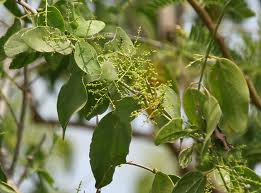| PlantID | 0097 |
| Botanical Name | Salvadora persica |
| Common Name | Chotapilu |
| Classification | | Kingdom: | Plantae | | Subkingdom: | Tracheobionta | | Division: | Magnoliophyta | | Class: | Magnoliopsida | | Subclass: | Rosidae | | Order: | Brassicales | | Family: | Salvadoraceae | | Genus: | Salvadora | | Species: | persica |
|
| Part used | Fruits, seeds, flowers, leaves, bark and root. |
| Medicinal Properties | Gastric stimulant. Fruits: alternative, carminative, debostruent, diuretic, lithotriptic, purgative and stomachic. Seeds: diuretic, purgative and tonic. Flowers: laxative, stimulant. Leaves: antidotal. Stem-bark: stimulant and tonic. Root-bark: vesicant.
|
| Medicinal Use | useful in the treatment of abdominal lump and piles. Fruits: useful in the treatment of lithiasis, rheumatism, splenomegaly and tumor. Seeds: seed oil applied locally in rheumatism. Flowers: beneficial in the treatment of gonorrhoea, leprosy. Leaves: decoction in asthma and cough.poultice in painful piles and tumors, juice in scurvy. Stem-bark: decoction useful in fever, used as stimulant and tonic in amenorrhoea.
|
| Chemistry | Seeds: lauric, myristic, palmitic and oleic acids.Root: octacosanol, 1-triacontanol, beta-sitosterol. Stem: 3-O-beat-D-glucopyranoside, glucotropaeolin. Root-bark: trimethylamine as chloride. Root: kaempferol, quercetin, quercitrin, rutin, sinigrin. Leaves: glucotropaeolin.
|
| Cultivation | NA |
| Regional Habitat | Commonly founds in drier climates and wastelands. Ascending upto 500 m. Distribution: Banswara(Loharia), Bikaner(Shivbari), Jaipur(Amer), Kota, Baran, Sirohi(Abu Road). |
| Description | A small, glaucous tree. 4-7m high, with drooping branches. Leaves: opposite, entire, ovate or oblong-obtuse. Flowers: dull yellow, borne in compound, terminal or axillary panicles, numerous in the upper axils. Bracts minute. Calyx campanulate, lobes 4, imbricate. Corolla campanulate, yube with 4 small teeth between the bases of the filaments, lobes 4, imbricate. Stamens 4, alternate with its lobes. Ovary 1-celled, stigma truncate, ovule 1, erect, basal. Drupes globose, 1-seeded, supported by the slightly enlarged calyx and subpersistent corolla. Flowers and fruits during December-June.
|
| Image |  |


